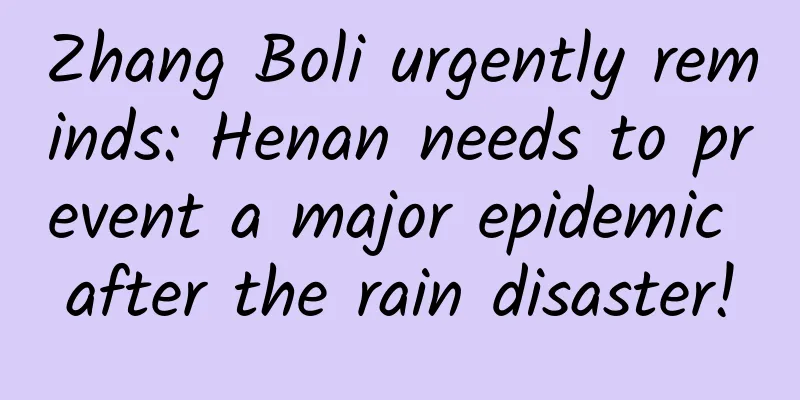Zhang Boli urgently reminds: Henan needs to prevent a major epidemic after the rain disaster!

|
Heavy rain in Henan has caused concern. The head of the Henan Provincial Meteorological Observatory told the media that the rainfall will continue on July 22, and the risk of disasters is extremely high. The disasters brought by heavy rains will not only put people in danger, but may also damage urban and rural tap water pipe systems, sewer systems, sewage treatment plants, landfills, composting sites, etc. Bacteria, viruses, parasites, etc. will spread with the spread of floods, posing huge hidden dangers to people's health. "Henan needs to prevent a major epidemic after the rain disaster." On the 21st, Science and Technology Daily contacted Zhang Boli, honorary president of Tianjin University of Traditional Chinese Medicine and academician of the Chinese Academy of Engineering, on how to avoid diseases after the rain disaster. He pointed out that the sanitary conditions are poor after the flood, and it is particularly easy for infectious diseases to break out, and special attention should be paid to prevention. Photo by Zhao Zishuo from Xinhua News Agency Pay special attention to these infectious diseases "In terms of transmission routes, intestinal infectious diseases, waterborne infectious diseases, vector-borne infectious diseases, respiratory infectious diseases and contact infectious diseases are prone to occur." Zhang Boli reminded that the public should pay attention to the fact that heavy rains have caused tremendous changes in the environment, and these changes are more conducive to the breeding of mosquitoes, flies and bacteria. Take waterborne diseases as an example. Water is an important medium. Infectious diseases including hepatitis A, schistosomiasis, cholera, dysentery, etc. can be spread through drinking or contact with water contaminated by pathogens. The characteristic of this kind of infectious disease is that once the water source is seriously polluted, it can break out and a large number of patients will suddenly appear in a short period of time. According to historical data, cholera, typhoid, dysentery and infectious hepatitis, such as hepatitis A and hepatitis E, have all caused epidemics due to flood outbreaks. Data show that after the 2005 Pakistan earthquake, more than 1,200 people developed acute jaundice. These people were diagnosed with hepatitis E. After the 2004 Bangladesh flood, a diarrheal outbreak occurred, affecting more than 17,000 people. The pathogens were Vibrio cholerae and hemorrhagic Escherichia coli. After the West Bengal flood in 1998, more than 16,000 people were infected with Vibrio cholerae. Prevent major epidemics, Achieve "One Absolute No, Two Protections" "Never eat poultry, livestock, or aquatic products that have drowned or died of disease, and do not eat food that has been rotten or soaked in sewage." Zhang Boli emphasized that many infectious diseases enter the human body through ingested food. Many foods changed during the flood, which is not obvious on the surface. Some people are reluctant to deal with the livestock that died in the flood, or eat the soaked food. Although these foods may not look changed on the surface, microorganisms actually multiply very quickly on them. Before the spoilage can be seen, the microorganisms have already grown vigorously, so they must not be eaten. "Pay attention to food hygiene when eating. Do not drink raw water. Try to drink relatively clean water, such as sealed barreled water, bottled water or boiled water." Zhang Boli reminded that food processed at home must be cooked thoroughly, and raw and cooked food must be separated. Zhang Boli also reminded the public to implement "two protections": one is to protect the surrounding environment and clean it as soon as possible; the other is to protect the skin and use appropriate medication. Clean up the environment as soon as possible after rain to avoid breeding of mosquitoes, flies, bacteria and other microorganisms, which are the main vectors of infectious diseases. If there is stagnant water in the pots, bowls, and jars in the living area, mosquitoes and flies will soon lay eggs in them, and larvae will breed. Dengue fever and Japanese encephalitis are mosquito-borne infectious diseases. Therefore, we should not only avoid being bitten by mosquitoes, but also destroy their nests and change the environment that is easy to breed mosquitoes and flies as soon as possible after rain. "For skin-infectious diseases, we must strengthen our awareness of self-protection, minimize contact with water and soaking in water, or rinse, clean and wipe it clean after entering the water." Zhang Boli reminded that if the skin is damaged, we must clean the injured area, keep it dry as much as possible, and apply skin topical medications in time to prevent pathogens from invading the human body through the skin and mucous membranes. For example, sandals should be washed promptly after wading in water. Unknown pathogens in rainwater may also cause allergies, and even lead to blood spots, rashes, eczema, etc. In areas where schistosomiasis is prevalent, special attention should be paid to avoid snails, which are the intermediate hosts of schistosomiasis. Schistosomiasis can cause schistosomiasis in humans, livestock, and poultry, which is a serious health hazard. After the rainstorm, more diseases need to be vigilant. Zhang Boli especially reminded that we should not relax our efforts to prevent the COVID-19 outbreak from rebounding after the flood. After the disaster, the affected people gathered together, and the group did not eat enough and sleep enough, which would weaken the body's resistance. At this time, if there were confirmed COVID-19 or asymptomatic infections, it would be particularly easy for the virus to spread rapidly. Therefore, while resuming production and disaster relief, we should still be cautious in COVID-19 prevention, strictly wear masks, try to avoid large-scale crowds, and open windows for ventilation. ◎ Science and Technology Daily reporter Zhang Jiaxing Source: Science and Technology Daily Editor: Wang Yu Review: Julie Final judge: He Yi |
Recommend
What to do if your menstrual period is black and heavy
I don't know what's going on recently. My...
What causes back pain after ovulation?
The ovulation period is a very important period f...
What is the normal range of cervical length during pregnancy?
Women will have some examination items after they...
What kind of vermicelli is good for stir-frying bean sprouts and vermicelli? What kind of vermicelli is good for stir-frying bean sprouts and vermicelli?
We all know that bean sprouts are a common vegeta...
These 3 types of people are really not suitable for taking naps! Check if it’s you
Spring sleepiness, summer fatigue, autumn naps, a...
What causes lower abdominal pain after childbirth?
After giving birth, women must take good care of ...
Do you know what women with kidney deficiency and low back pain should eat?
I have back pain all day long. It hurts when I wo...
What to do if your vagina is itchy
Vaginal itching is a very common symptom. For fri...
If your girlfriend has menstrual cramps, don’t ask her to drink hot water anymore. You can also do this…
"Oh, I can't drink cold drinks!" &q...
Will gynecological inflammation cause constipation?
Women's reproductive structure is relatively ...
What should I do if my menstruation doesn't come?
Women are very concerned about menstruation, beca...
What is the method to check fetal heart rate and embryo during pregnancy?
During the prenatal checkup, pregnant women shoul...
What is the cause of thin and fishy leucorrhea?
Leucorrhea that is thin and has a fishy smell is ...
Can eye drops cure cataracts?
Due to information asymmetry, it is inevitable th...
Can athlete's foot be treated during breastfeeding?
Athlete's foot is a very common disease in li...









